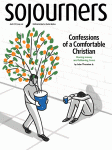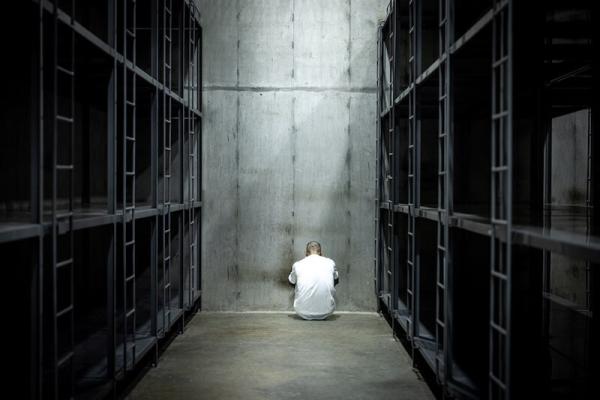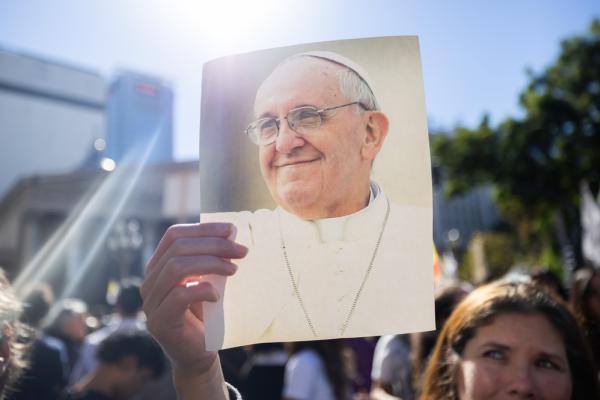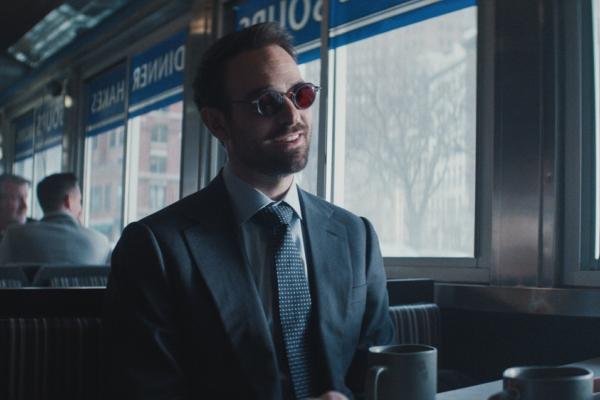“JOHN, THERE'S, UH, A GUY YOU NEED TO COME SEE see in the sanctuary. I think he’s angry or upset or something.” Hearing these words on a Sunday morning while I sat in my office preparing for worship meant one thing: Someone needed money. One of the hazards (or opportunities) of working in a downtown church was that the steeple and columns out front signaled to people that they should drop in when they needed a few dollars. I became the go-to minister on staff to greet these visitors.
I heard the man before I saw him. His sobs were audible over the only other noise in the space, the women arranging flowers for our 10:30 a.m. service. He was seated in the next-to-last row of the opulent sanctuary built in 1924. White and in his 40s, the man looked put-together but sweaty, his denim jacket well-worn. I introduced myself, told him I was glad he’d come to our church that morning, and asked if there was anything I could do for him. The man—I’ll call him James—told a familiar story: He’d arrived from out of town, didn’t know anyone in Winston-Salem, and was currently living at a shelter down the street. “I just don’t know what I’m going to do. I’m desperate,” he said at a volume that caught the attention of the flower arrangers. “I need some money for a bus pass and I’ve got to find work. I don’t know why God would do this to me.”
“This,” he said pointing to the piece of paper in his hand, “this is all I want. How can I get this?” He was holding a flyer for our discontinued financial literacy class. I told him we no longer offered the class and didn’t have any funds available for assistance.
I drive a car, go on vacation, and eat at restaurants with friends. I have health insurance, a bank account, and a job. I knew I ought to help the man, but I didn’t. Our church’s policies around requests of this kind required more oversight than I could give at that moment, and my mind drifted to the other duties I had that morning. I invited him to stay for worship and told him if he came back later in the week, I might be able to refer him to some agencies that could help.
James stayed for the service, sobbing quietly on occasion. In the months that followed, I saw him around downtown, but never again in the sanctuary. I felt disappointed for failing to offer help, for getting caught between conviction and institutional responsibility. As someone who works in ministry, often with poor people, I’ve learned to live with that feeling to get through my work. Yet I don’t want to make peace with that feeling; doing so would be giving up too easily.
Consider the moth
That the United States is a country of inequality is no secret. In 2011, Occupy Wall Street put financial inequality on the cultural and political map, and it has not left since. But having inequality on our political and cultural map is one thing; figuring out what to do about it in our own lives is another.
According to scripture, economic inequality is sinful. The prophets continually warn Israel that exploitation of the poor warrants God’s judgment. Jesus—raised on his mother’s song about God lifting up the lowly and casting down the mighty—announces good news for the poor. But as Christians called to a life of faithful discipleship, what does that mean for those of us who have money in our bank accounts, perhaps even a 401(k), when there’s a desperate person sitting in the sanctuary?
In Matthew 19:16-22, Jesus seems to offer a clear answer to this dilemma. Approached by a young man with “many possessions” who wants to know what he ought to do to more fully love God and his neighbor, Jesus offers instructions that have unsettled Christians for millennia: Sell all you have, give the proceeds to the poor, and follow me.
In Hope in the Dark, Rebecca Solnit writes about the dangers and possibilities of utopic horizons. There’s a danger that we hold onto such visions too tightly only to become sorely disappointed when they don’t come to fruition when we think they should. But Solnit also notes that nocturnal insects, like moths, use the stars and moon to navigate even though these creatures will never achieve the altitude they’d need to reach outer space. She hopes those working for social justice do the same with their own visions of utopia: use them in navigating this world toward the next, even if we don’t quite see how the two will meet. Heaven isn’t just a destination, but also “an idea to navigate Earth by,” she writes. “Don’t believe that the moon is useless unless we land on it.”
I think about Solnit’s words when I read Jesus’ instructions in Matthew. Few people will ever walk on the moon, just as precious few saints take a vow of poverty, get rid of their possessions, give to the poor, and follow Jesus. But the rest of us can’t just dismiss Jesus’ words as hopelessly unrealistic. Instead, Jesus’ words hold us to a higher standard and help us to navigate life here.
About that barn
In Luke’s gospel, Jesus tells the story of a “rich man” whose harvest produces a huge return. He builds up big barns for himself, storing up the surplus so that he can prop up his feet and enjoy life. But that night, the guy dies. Jesus warns the thousands listening, “So it is with those who store up treasures for themselves but are not rich toward God.”
One way of reading this passage is as a condemnation of retirement savings, 401(k) plans, even bank accounts. After all, that money could be used to help those in need, buy a bus pass for James, or even secure a few months’ rent.
But I’m not sure that reading gets at the full financial picture of many people’s lives. We may worry about living a more faithful life with regards to our money, but we aren’t ready to kick back like the man in Jesus’ story. A recent survey found that 61 percent of Americans couldn’t cover a $1,000 expense with their current savings. Similarly, 40 percent of Americans couldn’t even manage $400. It seems like everyone I know, save the wealthiest few, is just one job loss and hospital visit away from financial ruin.
In The Financial Diaries, economics professor Jonathan Morduch and financial expert Rachel Schneider studied the financial lives of 235 families, some in poverty and others solidly middle class. They discovered a hidden force in people’s lives: financial instability. Income and expense fluctuations from year to year and even month to month mean that many families—even those whose end-of-year income places them above the poverty line—spend time below it.
I think about these findings when I remember the sanctuary filling up that morning I met James. Looking out at the congregation from behind the pulpit, I saw senior citizens living off Social Security checks, 20-somethings with thousands of dollars in student debt, a family whose financial hardships threatened to tear their marriage apart, a young couple with a mortgage, and a kid losing a job.
So while we may have barns built for a surplus like the man in Jesus’ parable, few of us have enough grain to kick back and take it easy; usually we have just enough to get to the next harvest and keep moving. Which is where we find ourselves today: Financial inequality creates the problem, but instability makes us nervous to act. The result is that things stay the same. James is still looking for financial peace; each of us worries about our own situation.
I’m convinced that if we’re to resolve these tensions between obedience and compromise, the feeling of helplessness and desire for change, we must do it together.
Yours, mine, ours
When people describe the kinds of community they’re looking for in a church, they often use the word “authentic”—a group of people willing to be open, honest, and trustworthy about their lives. So many of us have had the opposite experience, where the church preached one thing while the leaders did something else. People also want a place to be vulnerable, where leaders name their own struggles and people don’t fear talking about the problems they face in their lives.
If church is a place to be authentic and vulnerable, that should include our financial lives. A recent survey found that millennials more frequently fear debt than death, yet our reluctance to talk about money in church obscures its place of concern in our lives. Church becomes just another place to pretend we have it all together—even though many struggle to pay for the basics and most of us live on the edge.
But what if we assumed we’re all financially vulnerable? What would church look like if we understood that we could speak truthfully and openly about our financial worries and imagine a different way of being a community together?
To start, we’d need to ask different questions. We often frame Bible passages about money as individual choices: Am I to sell everything I have and give it to the poor? How much is enough for me and my family?
One problem with this is that it accords quite well with a capitalist economy that wants us to treat all matters of money, including its faithful use, as personal problems. Our present political and economic arrangements require us all to think of ourselves as lone individuals. I have my bank account, my earnings, but also my debt, my fear of a job loss.
Scripture challenges that understanding. Jesus tells the story of the man with the barns in response to a question about divided inheritance and follows it with an admonition for his followers to worry less about tomorrow and more about giving to those who need it. One can’t help but think that if they followed Jesus’ advice, they might find themselves in a very different kind of community. And in the story of the young man with many possessions, Jesus doesn’t just tell him to sell his possessions and give to the poor; Jesus also invites the man to join Jesus’ followers.
Should we sell our possessions and give to the Jameses of our lives? Probably. But we do so not to be good individuals, but rather because Jesus instructs us to form a community that counters the individualism of our larger society. Our money divides us from one another through inequality and instability. As philosopher G.A. Cohen puts it in Why Not Socialism? “We cannot enjoy full community, you and I, if you make, and keep, say, 10 times as much money as I do, because my life will then labor under challenges that you will never face, challenges that you could help me to cope with, but do not because you keep your money.”
We belong to one another. We need to shift our thinking from “How can I live faithfully with my money?” to “How can we live faithfully together?” To answer this new question, we need to confess our vulnerability and worry, redistributing what we have to ensure a different future. If asked to imagine our financial future, that vision must include housing for the homeless, health care for the sick, and freedom from debt. If I try to imagine my financial future and it doesn’t include my congregation or James, I haven’t imagined the kingdom of God.

Got something to say about what you're reading? We value your feedback!







